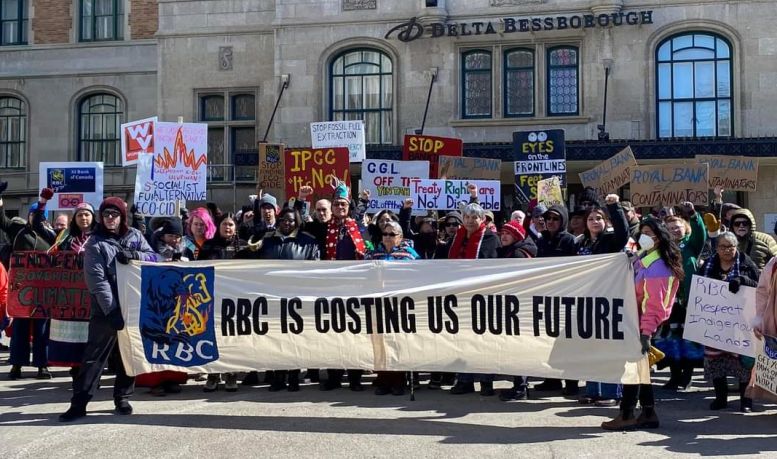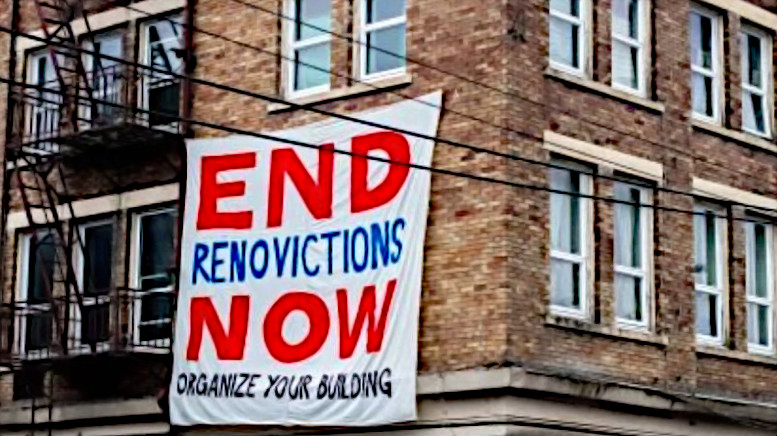“I was manhandled by RCMP officers, my ceremonial dress, which has never been defiled since my grandfather’s time, will never be the same again.”
These words by Chief Na’Moks, Hereditary Chief of Wet’suwet’en, express the outrage at the RCMP’s actions at the Annual General Meeting (AGM) of RBC, held on April 5 in Saskatoon. Indigenous Land and Water Protectors, including Wet’suwet’en Hereditary Chiefs and Haudenosaunee, Mi’kma’ki, Northern Alberta Nehiyaw, and Denesuline attended this meeting at the Delta Hotel with proper proxies, according to bank’s own rules.
Chief Na’Moks, along with Wet’suwet’en Hereditary Chief Gisdaywa and Elder Aunty Janet and others, were segregated in a small room apart from the main meeting. Then the RCMP physically threw them out for “being disruptive.”
These Chiefs and Elders clearly represented no physical threat to anyone at the AGM, but the RCMP were mobilized in force against them. This, along with the violence at Wet’suwet’en and Fairy Creek, reveals how the RCMP are used to intimidate and threaten land defenders and Indigenous elders to defend the rule of the capitalists and the RBC executives.
A representative for the Indigenous delegates spoke through tears as she left the hotel, “as an African American woman from the deep south being ‘segregated in a small room’…only to be thrown out minutes later was more than one could take.” Another described Jim Crow type segregation.
The RCMP had a busy day, spying on the solidarity march and rally outside the Delta Hotel with 150 protestors on a -30 °C cold snap. The police closed off all roads to the Hotel and had very visible spies watching from several high buildings. Calls from the crowd to “come down and talk” or “you must be cold up there” brought a smile to many. The solidarity between several different groups was heartening. Having three drum circle dances helped warm cold hands. One of the authors, who had a walking stick originally stayed back until told, “we got you” and was half carried with no complaints around the beautiful singing and drumming.
Cedar George-Parker, a member of the Tulalip and Tsleil-Waututh, came from BC and spoke. “When a pipeline spill happens, it’ll destroy the salmon habitat and affect all 200 species, including orca whales. The salmon can’t get up and say, ‘You’re killing my children!’ The orca whales can’t get up and say, ‘You’re killing our house, our habitat, our children!’”
Saskatoon Socialist Alternative had a handwritten placard, which featured prominently in the media, that said, “We can’t afford another planet,’” and in Cree, “kakêpâtisiwin kôh- katwâtakan,” meaning stupidity leads to cruelty. Chants of “Water is life!” and “No means no!” were plentiful.
RBC leadership remains shameless in their hypocrisy. In a 2022 statement they stated, “we believe climate change is one of the most pressing issues of our time, and everyone has a role to play,” and that “Coastal GasLink is an example of a responsible project.” But when confronted this time in Saskatoon, RBC CEO Dave McKay claimed that “it’s not fair to hold us accountable for anything that happens day to day in that project.”
This is about more than just one pipeline for RBC. In 2022, RBC was the biggest funder of fossil fuel projects in the world, spending a total of US$42 billion to fund fossil fuel projects. They say they are committed to an “orderly transition” away from fossil fuels, but in reality, they are the world’s biggest funder of fossil fuel expansion.
This is also not just a problem with RBC. Scotiabank and TD Bank both also cracked the top ten worldwide funders of fossil fuel projects, and the big five Canadian banks collectively spent US$140 billion on these projects.
It has never been more obvious that the “greenwashing” rhetoric of corporations and financial institutions is totally false. Fossil fuel production will never stop being profitable, so investors will never be able to resist the drive for increasing profits through increasing production. Even as a section of the capitalist class now recognizes the climate crisis as an existential threat to humanity, their economic system is incapable of solving the problem, and just keeps accelerating faster and faster towards catastrophe.
The efforts of the Wet’suwet’en Chiefs to use RBC’s own legal processes have exposed the bank’s hypocrisy and callous disregard for Indigenous people and their land. These institutions, and the capitalist system as a whole, is irreformable. The big banks and fossil fuel corporations need to be expropriated and taken into public ownership under democratic control so that their wealth and resources can be directed towards a genuine transition to a green economy. This will require mass movements that link the Indigenous people and Land Defenders, who are already fighting to defend their territories, with the broader labour movement that can use strikes to prevent these corporations from making profits.




